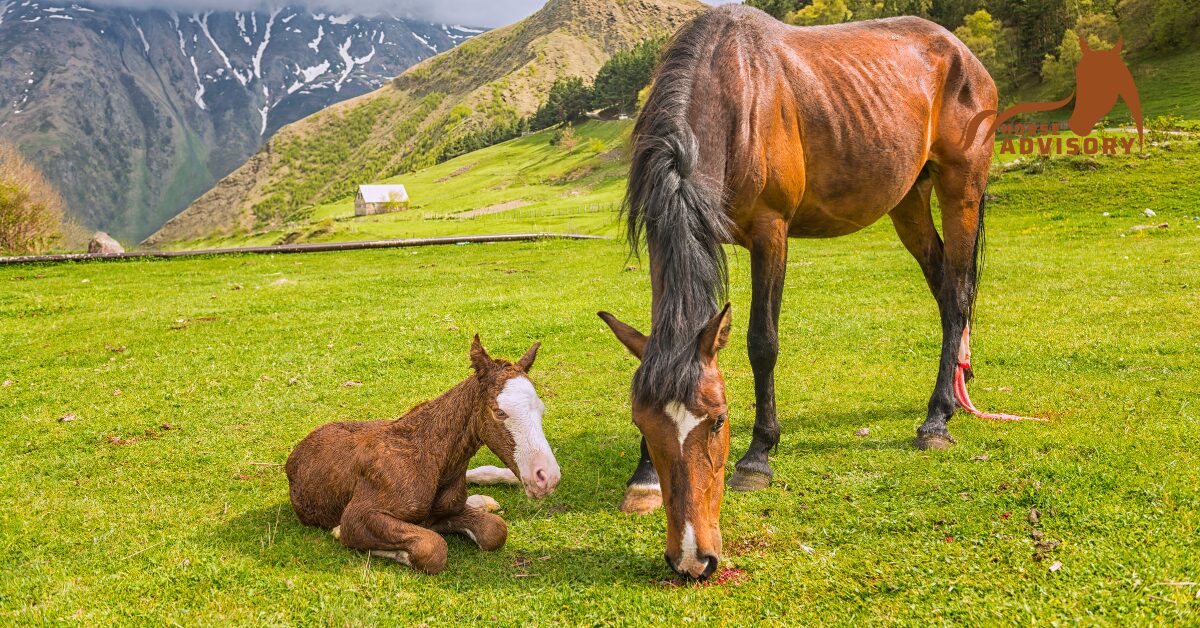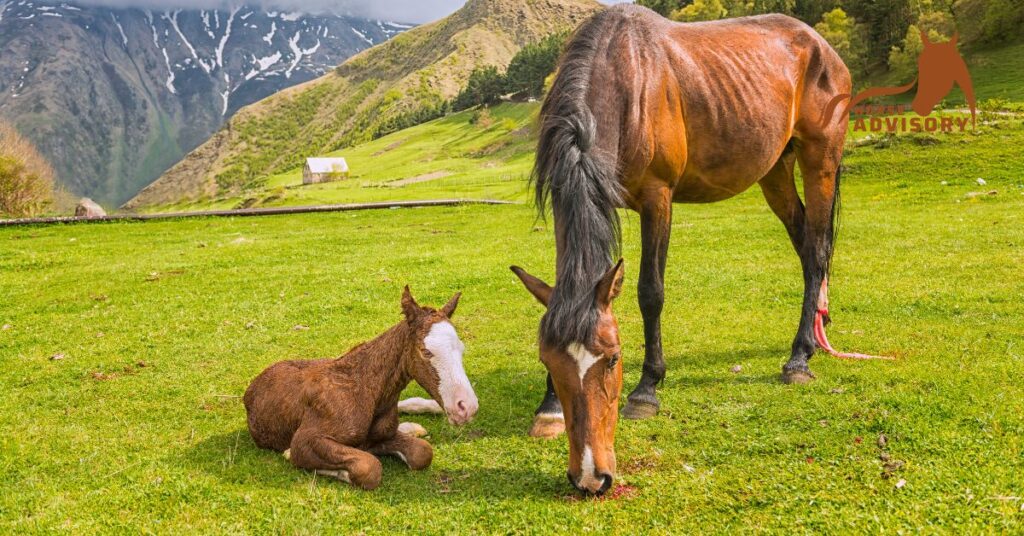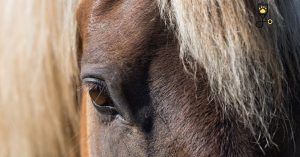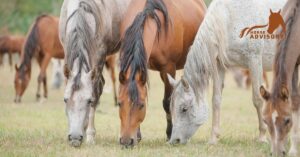Welcoming a newborn Arabian foal into the world is a thrilling experience for any horse enthusiast. Known for their intelligence, stamina, and beauty, Arabian foals require special attention to ensure a healthy start. This blog post will guide you through essential care tips for newborn Arabian foals, helping new breeders and horse owners support their development effectively.
Immediate Care After Birth
Immediate care after the birth of an Arabian foal is critical for ensuring the health and well-being of both the foal and the mare. Here’s an expanded look at the essential steps to take in the crucial first few hours:
Ensure the Foal Stands and Nurses
In the first hour after birth, it is vital for the foal to start attempting to stand. This is a crucial milestone indicating strong reflexes and muscle function. By two hours, the foal should be standing and nursing, which is essential for acquiring colostrum from the mare.
Colostrum is rich in antibodies and nutrients that protect the foal from infections and kickstart their immune system. A challenge here can be ensuring the foal latches correctly, as some may struggle initially. If difficulties arise, gently guide the foal to the mare’s teats and ensure the mare is calm and cooperative. Regular monitoring is important to ensure the foal is nursing effectively.
Monitor the Mare’s Health
After foaling, it’s crucial to assess the mare for any complications, such as excessive bleeding or signs of distress. One key aspect is ensuring that the mare expels the placenta completely within a few hours post-birth. Retained placental tissue can lead to infections, which are dangerous for the mare.
Providing a calm environment and minimal disturbances is beneficial for the mare as she bonds with her foal. This bonding period is essential for the foal’s emotional development and security. Observers should be vigilant but unobtrusive to prevent stress in the mare, as stress can interfere with milk production and bonding.
Check Vital Signs
Regularly checking the foal’s vital signs helps in early detection of potential health issues. The foal’s breathing should be steady and regular, with a rate of about 60 to 80 breaths per minute shortly after birth, slowing to 20 to 40 breaths per minute after the first hour. The body temperature should be maintained between 99-102°F.
Hypothermia is a risk if the foal is born in a cold environment, so keeping the area warm and dry is essential. Additionally, watch for signs of distress or abnormal behavior, such as excessive lethargy or failure to suckle, which may indicate underlying health issues requiring veterinary attention.
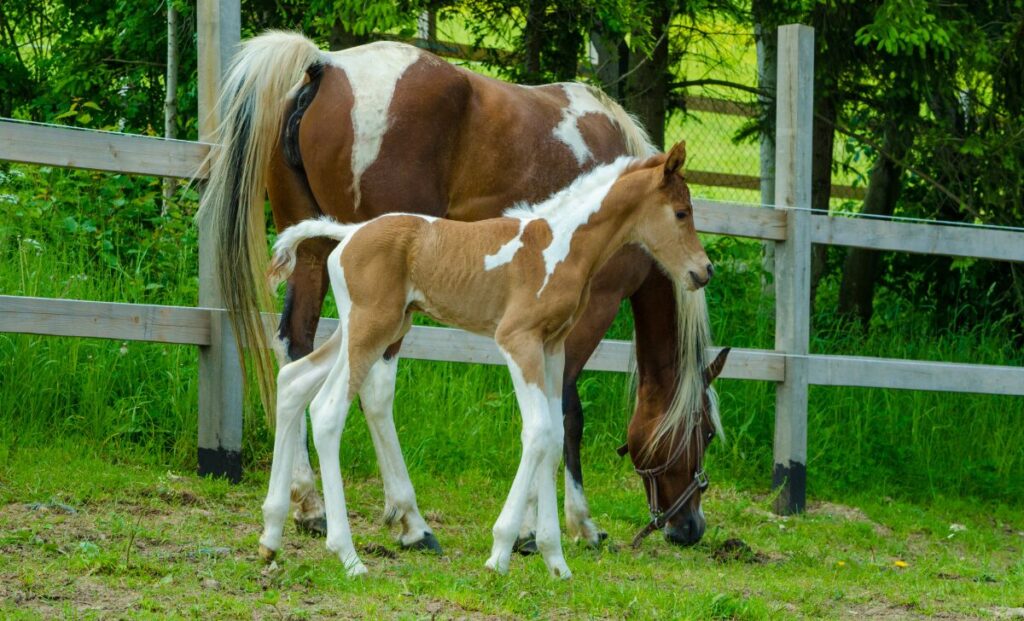
Creating a Clean and Safe Environment
Providing a clean, secure environment is essential for the health of both mare and foal:
Stable Hygiene
Start by thoroughly cleaning the stable before the mare’s due date. Remove any accumulated debris, old bedding, and waste materials. Use horse-safe cleaning agents to disinfect the area, targeting bacteria and pathogens that could cause infections. Fresh bedding, such as straw or shavings, should be laid down generously and changed frequently, especially after foaling, as the area can quickly become soiled.
Establish a regular cleaning schedule to maintain cleanliness. This might include daily mucking out and a weekly deep clean. Consistent maintenance minimizes the buildup of harmful bacteria and reduces health risks for both mare and foal.
In busy stables, maintaining high hygiene standards can be challenging, especially when managing multiple animals. Prioritize the health of the mare and foal by dedicating resources or personnel to their care. Automated cleaning systems can also be considered to ensure consistency and efficiency.
Safety Measures
To prevent the foal from escaping or injuring itself, ensure all gates and doors are securely fastened. Conduct regular inspections to identify and repair any broken latches or weak points that might be overlooked, especially as foals are curious and may attempt to explore beyond their space.
Conduct a thorough inspection to remove any sharp objects, protruding nails, or broken fixtures within the stable. Consider installing corner and wall padding to prevent injuries as the foal learns to move around. Make sure any feeding equipment is securely fastened and safe for use.
While it’s important to secure the environment, foals benefit from exploration to aid their development. Create a safe, confined area within the stable where the foal can explore without risk. This might involve using soft, non-slip flooring and ensuring there are no tight spaces where the foal could get stuck.
Balancing safety with the foal’s need for space to move and explore can be tricky. Regular checks and updates to the stable setup may be necessary as the foal grows and becomes more active. Engaging with a vet or equine specialist for advice on creating an optimal environment can be beneficial.
Nutrition and Feeding
Proper nutrition is critical for the growth and health of your foal:
Colostrum Intake
Colostrum is the first milk produced by the mare after giving birth, rich in antibodies essential for the foal’s immune system. This “liquid gold” provides the necessary immunity boost to protect the foal from infections during the early days of life when its immune system is still developing.
It’s crucial that the foal ingests adequate colostrum within the first 12 to 24 hours after birth, as the ability to absorb antibodies decreases rapidly after this period. Monitor the foal to ensure it begins nursing within the first two hours postpartum.
In some cases, the mare may not produce enough colostrum, or the foal may have difficulty nursing. In such scenarios, consider using a colostrum supplement. Consult with a veterinarian to determine the best course of action, as the timing and method of administration are critical to its effectiveness.
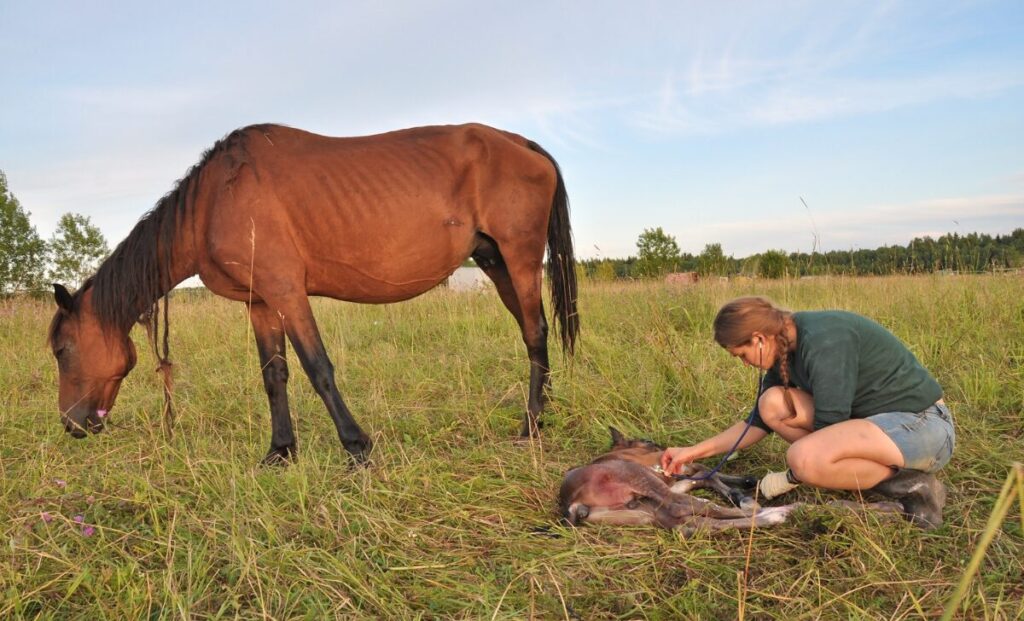
Supplementary Feeding
If the mare is unable to provide sufficient milk due to health issues or low milk production, supplementary feeding may be necessary. This is particularly important for orphaned foals or those with nursing difficulties.
Consult with a veterinarian to select a high-quality foal milk replacer specifically formulated to mimic the nutritional composition of mare’s milk. The replacer should provide essential nutrients such as proteins, fats, vitamins, and minerals needed for the foal’s growth.
Introduce the milk replacer gradually, ensuring the foal adjusts well to the new diet. Bottle feeding is often used, but care must be taken to prevent aspiration. For older foals, a bucket-feeding method might be more appropriate. Maintain strict hygiene when preparing and delivering the milk replacer to prevent infections.
Regularly monitor the foal’s weight gain and overall health to ensure it is thriving. A growth chart can be helpful in tracking progress and identifying any potential issues early. Regular veterinary check-ups will ensure the foal receives necessary health assessments and vaccinations.
The transition from mare’s milk to milk replacer can be challenging. Monitor the foal for any signs of digestive upset, such as diarrhea, and adjust feeding protocols as needed. Additionally, gradually introduce solid feeds as the foal grows, ensuring a balanced diet that supports continued development.
Regular Veterinary Check-Ups
Routine veterinary care is essential to monitor the foal’s health and development:
Initial Health Assessment
Within the first 24 hours after birth, a veterinarian should conduct a comprehensive health assessment of the foal. This initial check-up is crucial to identify any congenital abnormalities and to ensure that the foal is healthy and thriving.
During this examination, the vet will assess vital signs, check for signs of respiratory distress, and ensure the foal has consumed adequate colostrum. The vet may also evaluate the foal’s joints, eyes, and umbilical area for any abnormalities.
Scheduling a vet visit immediately after birth can be challenging, especially during busy seasons. Building a relationship with a local vet and keeping them informed of expected foaling dates can help ensure timely care. Additionally, be prepared to follow any immediate care recommendations the vet may provide.
Vaccinations and Deworming
A veterinarian will recommend a vaccination schedule tailored to the specific needs of the foal, the mare’s vaccination history, and prevalent diseases in the area. Common early vaccines may include tetanus, equine influenza, and equine herpesvirus.
Vaccinations are essential for protecting foals from contagious and potentially life-threatening diseases. By following a recommended schedule, you ensure that the foal builds immunity at the appropriate times, safeguarding their health as they grow.
Parasite control is another critical component of the foal’s health regimen. Deworming schedules are typically initiated at a young age, with timing and frequency tailored based on fecal egg counts and regional parasite risks.
Determining the right deworming protocol can be complex, as overuse of dewormers can lead to resistance. Consulting with a vet to perform regular fecal tests can help in formulating an effective deworming program. Additionally, maintaining pasture hygiene and rotating grazing areas can minimize parasite loads.
Ongoing Health Monitoring
Regular veterinary check-ups allow for the monitoring of the foal’s growth and development. Vets can provide guidance on nutrition, exercise, and any necessary adjustments in care as the foal matures.
Routine check-ups facilitate early detection of health issues such as developmental orthopedic diseases (DODs) or nutritional imbalances. Early intervention can significantly improve outcomes and reduce long-term health impacts.
Veterinary visits are also an excellent opportunity for owners to gain insights and education on best practices for foal care, including handling techniques, training, and overall management.
By prioritizing regular veterinary care, you not only protect the foal’s health but also ensure a strong start to a life of vitality and well-being. Remember, proactive care is always more beneficial than reactive treatment, and building a partnership with your veterinarian is key to achieving optimal health for your foal.
Unique Considerations for Arabian Foals
Arabian foals have specific traits that require attention:
Early Maturity and Vigor
Arabian foals are known for their rapid development and high levels of energy. They often display greater maturity early on, making it essential to channel their vigor constructively. This trait can be advantageous if managed properly, allowing them to excel in various activities and training programs at a young age.
To manage their energy levels, provide Arabian foals with ample space to move and explore safely. Incorporate playful and engaging activities that stimulate both their physical and mental development. This helps prevent destructive behaviors that can arise from boredom or pent-up energy.
Introducing Arabian foals to a variety of environments and experiences early on is crucial. This early socialization helps them become well-adjusted and confident adults. Encourage interactions with other foals and horses to develop their social skills and adaptability.
Handling and Training
Begin handling Arabian foals gently and consistently to establish trust and familiarity. Early handling should focus on building a bond through stroking, grooming, and leading exercises. Positive interactions lay the groundwork for more advanced training as they grow.
Arabian foals are highly intelligent and responsive to training methods that emphasize positive reinforcement. Use rewards such as treats, praise, or gentle pats to reinforce desired behaviors. Consistent routines and clear communication help them learn quickly and effectively.
Develop a structured training program that progresses in complexity as the foal matures. Start with basic commands and gradually introduce more challenging tasks. Ensure each training session is brief and engaging to maintain the foal’s interest and enthusiasm.
Handling Arabian foals requires patience and an understanding of their unique temperament. They can be sensitive and may react differently compared to other breeds. It’s essential to remain calm and patient, adjusting training techniques to suit individual needs.
While early socialization and training are beneficial, be cautious of overstimulation. Monitor the foal’s reaction to new experiences and provide downtime as needed to prevent stress or anxiety.
Practical Advice for New Breeders and Owners
Patience and Observation
Spending ample time observing your foal is essential. Each foal has a unique personality and set of behaviors that can offer insights into their health and development. By watching how they interact with their environment and other horses, you can better understand their needs and preferences.
Patience is vital when working with foals. These young horses are still learning about the world around them and how to interact with it. By remaining calm and patient, you create a nurturing atmosphere that encourages trust and confidence. Patience also allows you to respond appropriately to their actions, reinforcing positive behaviors and gently correcting undesired ones.
Foals communicate through body language and vocalizations. Learning to recognize cues such as ear position, tail movement, and vocal sounds can help you assess their emotional state and well-being. This knowledge enables you to address any issues promptly and effectively.
Engagement and Enrichment
Foals are naturally curious and benefit greatly from a stimulating environment. Providing safe toys and enrichment activities can enhance their mental and physical development. Toys that encourage movement, such as balls or ropes, can help improve coordination and strength.
Introduce a variety of textures and objects for the foal to explore. Items like hanging ropes, cones, or soft brushes can captivate their interest. Rotating these items regularly keeps the environment fresh and engaging, preventing boredom.
Facilitating interactions with other foals and gentle adult horses supports social development. These interactions teach important skills such as communication, play behavior, and social hierarchy, which are crucial for their later life.
By following these care tips, you can help your newborn Arabian foal thrive and grow into a healthy, strong adult horse. The journey of raising an Arabian foal is rewarding and filled with the joy of nurturing one of the most majestic breeds in the equine world. Whether you’re a seasoned breeder or a first-time horse owner, these insights will guide you through the early stages of your foal’s life, ensuring they embark on a path of health and vitality.
